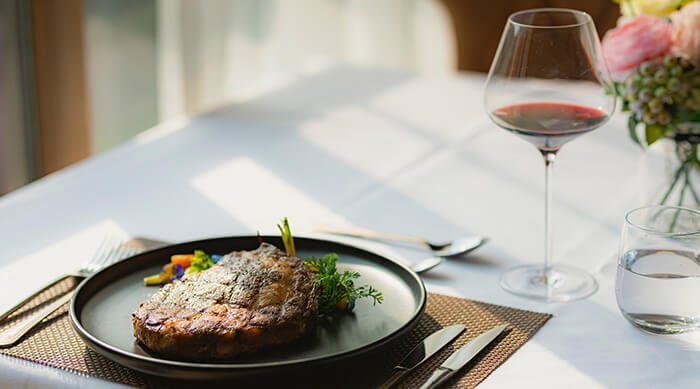Wine may not technically be paleo, but it can still be enjoyed in many mostly paleo diets.
Red wine, in particular, is fine by many faithful adherents of paleo, a diet popularized by those looking to fill their plates with more natural alternatives to processed foods.
While the short answer is that alcohol is not part of a strict paleo diet, understanding the main purpose behind paleo helps when seeking healthy beverage options.
What is Paleo?
The paleo diet is also known as the Paleolithic or caveman diet.
The basic premise of the paleo diet is limiting what you eat and drink to foods you could hunt and gather back in the Paleolithic era. The diet focuses on eating whole foods and avoiding processed foods. That means lots of lean meats, fish, fruits, vegetables, seeds, and nuts.
Strict paleo meal plans typically prohibit dairy, grains, and, yes, alcohol. Still, many of the diet’s followers have modified paleo to incorporate generally healthy foods in small amounts.
What can I drink on paleo? Plain water should make up most of what you sip on paleo. Most modified paleo diets suggest consuming moderate red wine and green tea is also acceptable.
The key is avoiding too much sugar in what you’re sipping. Soda water or sparkling water is fine; tonic water is not.
If you’re reaching for an alcoholic drink, dry hard cider or pure agave tequila is more paleo-friendly than other types of alcohol. Just watch out for mixers, and remember moderation is key. Most beer is a no-go because paleo is also a gluten-free diet.
Why Wine Is Paleo-Friendly (...ish)
If you’re sticking to a strict paleo diet, most say that avoiding alcohol altogether is your best bet. You may find justifications for wine out there about accidental fermentation during the caveman age.
Those arguments go like this: Cavemen (and women) surely must have had fermented fruits at some point in their lives, if only because they waited too long to eat those grapes they picked. Since wine is basically fermented grapes, drinking wine is just like that.
Most scholars agree, though, wine as a beverage wasn’t around until the Neolithic period.
Whether wine is legitimately paleo or not, most diet followers say a glass of wine here and there won’t bust your diet, especially if you’re reaching for red wine. Moderate red wine is permissible on most low-carb diets like keto.
There are benefits to red wine over white or rosé wine. Red wine is high in antioxidants like resveratrol, a known anti-inflammatory and cancer-fighting phenol. Most red wines are lower in sulfites, an additive that can cause allergic reactions in some, than white wine.
Of course, dealcoholized wine is even better. You’re still getting the positive effects of wine without the adverse effects of alcohol consumption.
How to Look for the Right Wines on a Paleo Diet
The paleo lifestyle is all about limiting how many processed foods and beverages you’re consuming. The more natural the wine, the better it is by paleo standards. Biodynamic and organic wines low in preservatives are ideal on a paleo diet.
You should also seek out wines that are lower in residual sugar. If you’re watching your blood sugar or concerned about diabetes risk, you probably know a dry red wine is better for you than sweeter, high sugar varietals.
Which wines are paleo-friendly? Red wines low on preservatives and residual sugars are more paleo-friendly than other wines. That includes dry red wines like pinot noir, cabernet, or merlot.
Sweet wines like Riesling or Moscato or dessert wines are high in residual sugar and best to avoid on a paleo diet.
Most paleo fans still think the occasional glass of white wine is acceptable. You’ll get fewer antioxidants than red wine, but you won’t mess with your diet too much if you reach for dry white wines like sauvignon blanc or pinot grigio.
Paleo Food & Wine Pairings
Now that you know that some wines are OK on paleo, incorporating a glass of paleo-friendly wine might make meal planning a little more exciting.
Here are a few ideas for paleo meals to pair with wines at your next wine tasting:
- Cabernet: This bold red wine works well with lean red meats or wild game. Enjoy it with a classic grilled steak and whatever veggies are in season, or throw cubed lean beef on kabobs with peppers and mushrooms.
- Pinot noir: Versatile pinot noir works well with most meals, but it’s especially delicious with roasted chicken. Try it with a whole chicken and roasted Brussels sprouts for a hearty meal that will keep you full.
- Sparkling rosé: Rosé has more resveratrol thanks to its pink hue over white wine, so it’s generally considered a healthier choice by paleo standards. Pair it with salmon over salad for a fresh meal that’s high in acidity. Make it a non-alcoholic rosé if you’re cutting back.
- Sauvignon blanc: A low-sugar white wine like sauvignon blanc is fine on paleo from time to time. Try it with a chicken stir fry where the veggies are the star over rice or noodles or a plate of garlic shrimp over zoodles.
Read Next: 12 Non-Alcoholic Wine Substitutes for Cooking With Wine
Possible Setbacks of Alcohol on Paleo
Red wine may be better than other types of alcohol, but that doesn’t mean you should throw caution to the wind when indulging in wine. You’ve heard about the health benefits of red wine, but drinking too much is a slippery slope that comes with a variety of health concerns.
Excessive drinking and binge drinking raises your cancer risk, accelerates aging, and can damage your mental health. Alcohol loosens inhibitions and may lead to overeating. If you’re on paleo to lose weight or lower your cholesterol, it’s important to moderate your alcohol content.
Drinking too much can also lead to some bad hangovers. The ethanol in alcohol has a mild dehydrating effect that leads to unpleasant symptoms the following morning. Wines high in tannins may contribute to that day-after headache.
Read Next: The Dos and Don'ts of Mixing Wine and Tylenol
When in doubt, moderate.
Wine in moderation can be a part of a healthy lifestyle.
The healthiest diets don’t have to include alcohol, though, and you’ll always find more reasons not to drink than reasons to drink. Drinking less or cutting alcohol altogether can also have the added benefit of weight loss.
That doesn’t mean you have to say goodbye to wine forever if you’re improving your health goals. You can still have wine if you’re abstaining from alcohol with Surely.
Try our red wine varietals like our non-alcoholic pinot noir or our dealcoholized cabernet for all the benefits of red wine without the alcohol. You can cut back on alcohol and keep it paleo with Surely wines.
Sources
- Early Neolithic wine of Georgia in the South Caucasus
- Resveratrol: A Double-Edged Sword in Health Benefits
- Effects of reduced levels of sulfite in wine production using mixtures with lysozyme and dimethyl dicarbonate on levels of volatile and biogenic amines
- Alcohol Consumption and the Risk of Cancer
- The Alcohol Hangover Research Group Consensus Statement on Best Practice in Alcohol Hangover Research






